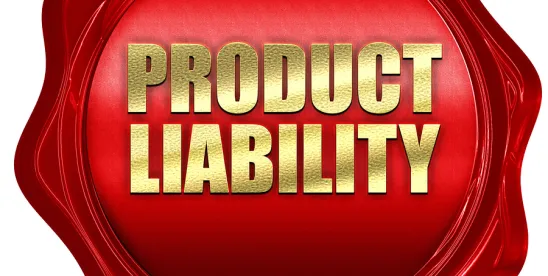On October 5, 2018, the U.S. Consumer Product Safety Commission (CPSC) announced that it had negotiated a $3.85 million civil penalty with Costco Wholesale Corporation over an alleged failure to report product hazards involving an electronic trash can, which CPSC alleged violated the Consumer Product Safety Act.
On its face, there was nothing particularly remarkable about this penalty, as compared to others we usually see. Costco had allegedly received 60 complaints of consumers experiencing injuries, “some of them serious,” but did not notify CPSC “immediately” of the hazard once Costco had enough information to assess it. Any injury number in the double-digits has the potential to raise CPSC eyebrows, and 60 such injuries can raise the eyebrows of an entire Commission, as it obviously did here.
The penalty of $3.85 million is in the $3-5 million range often seen for inadequate reporting that lacks aggravating factors such as high product price/profit, recidivism, or investigational misconduct. And the Costco penalty was accepted by a 4-0 vote, including two Republicans, with no concurring statements or other commentary to suggest anything amiss.
Then, on November 26, the other shoe dropped. The actual manufacturer of the trash can, EKO Development Ltd., along with a U.S. affiliate, EKO USA, LLC, agreed to pay a penalty of … $1 million – almost four times less. As opposed to Costco, which is alleged by CPSC to have received 60+ complaints of injury, EKO is allegedly merely to have received “complaints.” Even more interestingly, EKO was accused of approving a secret design change to address the alleged hazard, which traditionally is an aggravating factor because it suggests knowledge of the problem and an intent to hide it from regulators. An aggravating factor in most cases perhaps, but not here: by a 3-2 vote, with all three Republican appointees in the majority, and both Democratic appointees in the minority, the Commission accepted the $1 million penalty.
This series of events underscores some important takeaways.
First, as we continue to remind anyone who will listen, reporting penalties are not imposed on companies for selling defective products, but for failing to tell CPSC that they have sold defective products. In theory, a company could manufacture an endless series of defective products and still avoid penalties if they promptly reported the hazards to the government each time. (Note: please do not conduct business this way.) So, if a product is generating a number of injury reports in the field, consult with experienced counsel on whether you have a reportable issue, which is entirely separate from the question of what you should be doing with that product going forward.
Second, although it is difficult to say for sure, this appears to be a situation where the initial complaints would have come in to Costco, which presumably turned them over to EKO in some fashion and asked it to do something about them. At times, a retailer can feel “caught in the middle” in this situation, as the manufacturer is the expert on the product and the retailer believes that the manufacturer should be taking ownership of the situation and filing any required CPSC reports. While that approach may be the ideal, it is also not always realistic, particularly with overseas manufacturers unfamiliar with or uninterested in U.S. regulations. Indeed, EKO’s primary defense was that as a (primarily) Chinese company, it had no idea that the subject CPSC regulations even existed. To its credit, Costco contends that the product had been reviewed by its safety committee after initial reports were received, and no defect was found at the time, but CPSC obviously was not convinced.
Third, the case is a useful reminder that retailers who import products they sell – like Costco – step into the manufacturers’ shoes for CPSC purposes. The CPSA recognizes that the agency will face difficulty in redressing potential misconduct by foreign entities and empowers it to penalize domestic companies in their place. Retailers need to be even more diligent in their reporting obligations for products they import than for those they merely sell.
The bottom line is that retailers and manufacturers are equally subject to CPSC reporting regulations, but under CPSC’s rules retailers can satisfy their obligations with just a limited “initial report.” This benefit comes with a cost: retailers can shield themselves from sanctions with relatively little effort, but CPSC may view any failure to do so more harshly as a result. Retailers who wait for manufacturers to “do the right thing” are exposing themselves to regulatory and financial risk. This doesn’t mean every injury report a retailer receives is reportable, but does underscore the importance of taking ownership of any situation where a product generates reports of numerous injuries, particularly for imported products, where the retailer may be the sole domestic entity in the supply chain and thus the one most in CPSC’s reach.
Lastly, the Commission press release suggests that the size of the penalty is influenced by the small size of EKO. The settlement agreement also permits the penalty to be paid in installments, another suggestion that EKO successfully persuaded the CPSC it required special treatment. Company size is indeed one of the factors considered in a civil penalty decision. What’s interesting here, though, is that the approach with EKO represents a departure from recent CPSC practice in making small-company adjustments. Typically, as the Democratic commissioners point out in their dissenting statement, the Commission announces the penalty it would have imposed had the company been of a more typical size, and then suspends a large portion of it in the fine print. This gets the “official” penalty in the headline, and is viewed as a larger deterrent. It remains to be seen if this change in practice signals only a desire to be more straightforward about penalties paid, or foreshadows an overall downward trend in civil penalties generally, now that Republican appointees finally have a working majority on the Commission.
A side point these penalties raise is the value that CPSC’s seemingly moribund Retailer Reporting Program could have both for the agency and for regulated entities. If retailers could provide near real-time data to CPSC based on automated collection with clearly defined parameters, retailers would be able to satisfy their obligations even more easily and with less deliberation and less concern about damaging supply chain relationships. For CPSC’s part, the speed of reporting would be beneficial, but the agency would also be better equipped to discern trends among individual products across retailers or even product categories across brands. With increased talk of modernizing CPSC’s data collection and analysis under the new Republican majority, perhaps Retailer Reporting will see a new day.




 />i
/>i

